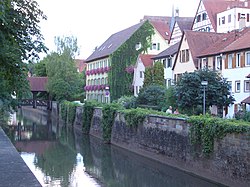Bietigheim-Bissingen
show This article may be expanded with text translated from the corresponding article in German. (February 2009) Click [show] for important translation instructions. |
Bietigheim-Bissingen | |
|---|---|
 Bietigheim Altstadt | |
 Coat of arms | |
show Location of Bietigheim-Bissingen | |
 Bietigheim-Bissingen | |
| Coordinates: 48°58′N 9°8′E / 48.967°N 9.133°ECoordinates: 48°58′N 9°8′E / 48.967°N 9.133°E | |
| Country | Germany |
| State | Baden-Württemberg |
| Admin. region | Stuttgart |
| District | Ludwigsburg |
| Subdivisions | 5 |
| Government | |
| • Mayor | Jürgen Kessing (SPD) |
| Area | |
| • Total | 31.29 km2 (12.08 sq mi) |
| Elevation | 200 m (700 ft) |
| Population (2020-12-31)[1] | |
| • Total | 43,146 |
| • Density | 1,400/km2 (3,600/sq mi) |
| Time zone | UTC+01:00 (CET) |
| • Summer (DST) | UTC+02:00 (CEST) |
| Postal codes | 74301–74321 |
| Dialling codes | 07142 |
| Vehicle registration | LB |
| Website | www.bietigheim-bissingen.de |
Bietigheim-Bissingen is the second-largest town in the district of Ludwigsburg, Baden-Württemberg, Germany with 42,515 inhabitants in 2007. It is situated on the river Enz and the river Metter, close to its confluence with the Neckar, about 19 km north of Stuttgart, and 20 km south of Heilbronn.
History[]

Towards the end of the 18th century Bietigheim saw during the beginning of the industrialisation an improvement of the living conditions and an increase in population. The 1806 furnished Oberamt Bietigheim was in 1810, however, dissolved again: the city and its official municipalities were integrated in the Oberamt Besigheim. After Bietigheim was connected mid-19th century to the railway network and the city experienced a real breakthrough and a sustained recovery. At the end of the 19th century there were 3,800 inhabitants. In 1938, Bietigheim came to the new Ludwigsburg (district). A branch of the Nazi Party was in Bietigheim since 1928. Until 1933, this was with 51 members relatively small. After the Nazi seizure of power there were 181 new entrants. By the end of the Nazi regime finally were 939 party members in Bietigheim, representing 10.4 percent of the total population in 1945. [2]
Buildings and sights[]

- 287 m long Bietigheim Enz Valley Bridge (German: "Bietigheimer Enzviadukt") (built in 1853)
- Old gate (only one still present, built in the 14th century)
- (Protestant) church in Downtown Bietigheim (built in 1401)
- Kilian church in Bissingen (built from 1517)
- Wine Press (now a building for public events)
- Town hall (built in 1506)
- "Hornmoldhaus" (built in 1536)
- Castle of Bietigheim (built in 1546, renovated between 2000 and 2002), nowadays home to the Bietigheim-Bissingen music school
- Marktplatz Webcam - provides 24/7 real-time coverage of Bietigheim's central market via the internet.
Infrastructure[]
Bietigheim-Bissingen station is located on an important railway junction on the Western Railway (connecting Stuttgart with Karlsruhe and Heidelberg) and the Franconia Railway to Heilbronn. Line 5 of the Stuttgart S-Bahn and line 5 of the Stadtbahn Karlsruhe both start here.
Notable people[]
Sons and daughters of the town[]

- Erwin Bälz (1849-1913), personal physician of the Imperial House of Japan and co-founder of modern medicine in Japan
- Elisabeth Goes (1911-2007), pastor's wife and Righteous Among the Nations
- Kurt Hager (1912-1998), member of the Politbüro of the SED in GDR
- Gebhard Fürst (born 1948), bishop of Rottenburg-Stuttgart and a member of the National Ethics Council
- Michael Jacobi (born 1960), member of Parliament from 1988 to 1991
- Heiko Maile, Marcus Meyn and Oliver Kreyssig, members of the German pop group Camouflage
- Matthias Ettrich, (born 1972) founder of KDE
- Roland Bless (born 1961) and Ingo Reidl (born 1961), members of the German pop group Pur
- Stefan Hofmann (born 1964), an author, psychologist, and professor at Boston University
- Namosh, (born 1981) a German musician and singer
- Bernd Leno, (born 1992) a football goalkeeper
- Shindy, (born 1988) a German Rap artist
People who lived there[]
- Ottmar Mergenthaler (1854-1899), inventor of the Linotype typesetting machine, spent four years in Bietigheim during his apprenticeship to a watchmaker
- Bernd Leno (born 4 March 1992), football goalkeeper for Bayer 04 Leverkusen, Arsenal FC, and the Germany national football team
Events[]
- Bietigheim Horse Market
- Music Exchange with Shawnee Mission South High School symphonic band every 4 years[3]
- Music Exchange with Shawnee Mission South High School string orchestra every 4 years[4]
- Music Exchange with Community High School District 99 Honors Band and Orchestra (Downers Grove, IL) every 2 years.
Business and industry[]
- Elbe & Sohn
Twin towns – sister cities[]
Bietigheim-Bissingen is twinned with:[5]
 Kusatsu, Japan (1962)
Kusatsu, Japan (1962) Sucy-en-Brie, France (1967)
Sucy-en-Brie, France (1967) Surrey Heath, England, United Kingdom (1971)
Surrey Heath, England, United Kingdom (1971) Szekszárd, Hungary (1989)
Szekszárd, Hungary (1989) Overland Park, United States (1999)
Overland Park, United States (1999)
References[]
- ^ "Bevölkerung nach Nationalität und Geschlecht am 31. Dezember 2020". Statistisches Landesamt Baden-Württemberg (in German). June 2021.
- ^ Michael Schirpf: Strukturbild der NSDAP in Bietigheim. In: Amerikanische Besatzung und Wiederaufbau 1945–1948. Blätter zur Stadtgeschichte, Heft 4, Bietigheim-Bissingen 1985.
- ^ teacherweb.com/KS/ShawneeMissionSouth/MrSteveAdamsBandDirector/h3.stm - 14k -
- ^ "Archived copy". Archived from the original on 2013-09-28. Retrieved 2013-09-25.CS1 maint: archived copy as title (link)
- ^ "Partnerstädte". bietigheim-bissingen.de (in German). Bietigheim-Bissingen. Retrieved 2021-02-10.
- Towns in Baden-Württemberg
- Ludwigsburg (district)
- Württemberg


